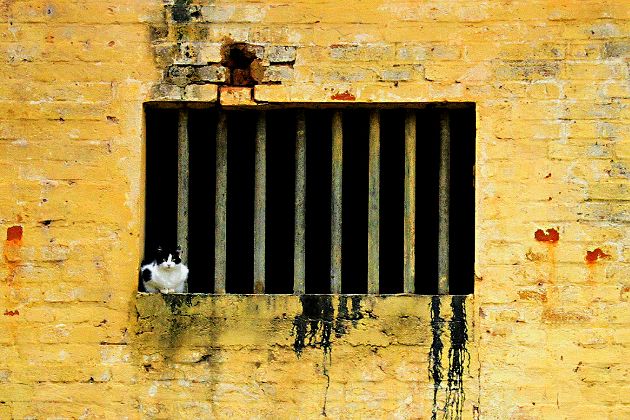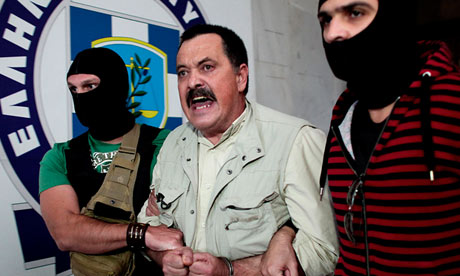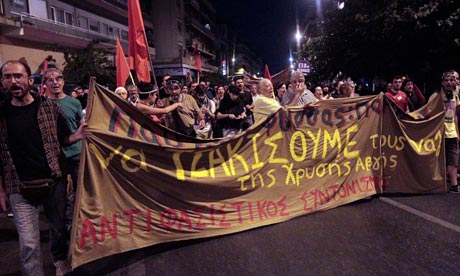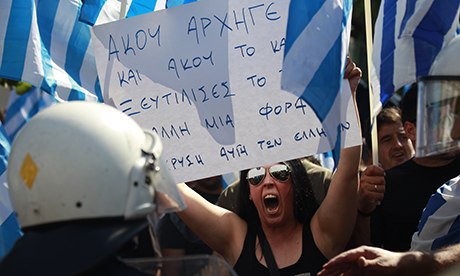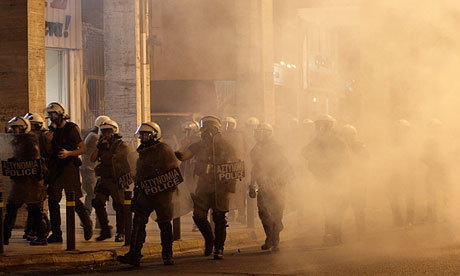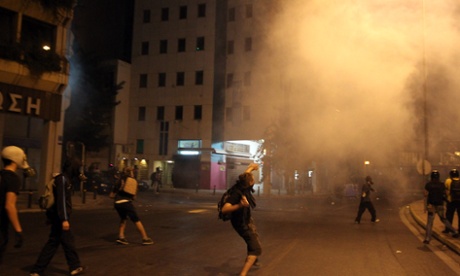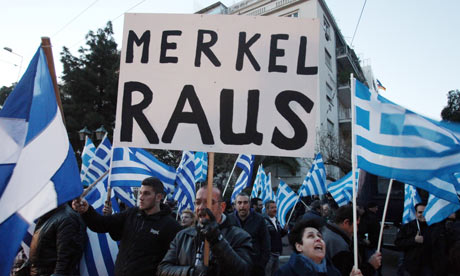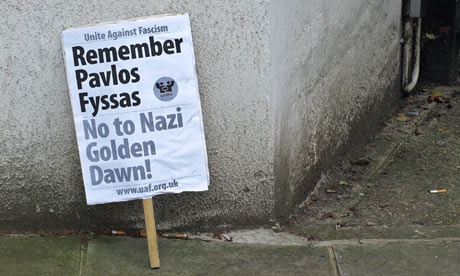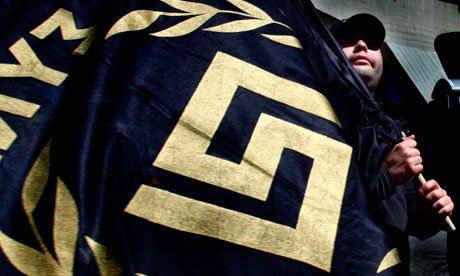Greece Moves to Outlaw the Golden Dawn Party
By - ALKMAN GRANITSAS and
- NEKTARIA STAMOULI
ATHENS—Greece's crackdown on the country's far-right Golden Dawn party, with the weekend arrest of the group's top leadership, is a needed fillip for Prime Minister Antonis Samaras's fragile coalition government.
But the boost may be temporary if the social problems that fueled the group's rise—unemployment, corruption, collapsing public services—aren't soon addressed by a government not many Greeks support, analysts say. And correcting those issues could take some time.

Golden Dawn lawmaker Christos Pappas, center, shouts at journalists as he is escorted by police on Sunday.European Pressphoto Agency
"There will be some political gains for the government and particularly Mr. Samaras, but after that, if the economy continues to stumble, those benefits will evaporate and the Golden Dawn phenomenon will return," said John Dimakis, a political analyst at Athens-based consultancy STR. "The crackdown on Golden Dawn won't bring jobs, or investments, or growth. And Golden Dawn is an expression of social needs that the political system right now can't cover."
Greece's economy is in its sixth year of a grinding recession that has sent bankruptcies soaring and unemployment to a record of around 28%, while almost two-thirds of young people lack a job. Although some green shoots have appeared, the economy is still expected to shrink by roughly 4% this year and stage only an anemic turnaround next year, meaning a jobs-creating recovery is at least a year away or if not longer.
The arrest of Golden Dawn leader Nikos Michaloliakos and almost two dozen others early Saturday is the boldest step yet by the government to effectively outlaw the party, known for its extremist views and tactics, by declaring it a criminal organization. The party is alleged by police to be connected to a series of violent incidents, including the alleged killing this month of a prominent left-wing rap artist, which prompted the government to act and which has turned public opinion away from the group.
Golden Dawn has repeatedly denied any role in the killing and says it doesn't condone violence. The top leadership of the party will be deposed by prosecutors on Tuesday. Mr. Michaloliakos has said a witch hunt has been launched against his party.
Last week, Mr. Michaloliakos threatened to pull the party's 18 lawmakers out of parliament, a move that could force by-elections and perhaps national elections, which the government has ruled out.
Golden Dawn traces its roots to the early 1980s, when it was founded by Mr. Michaloliakos, 55, an ex-special forces officer with alleged Nazi sympathies. Long known for his anti-immigrant and nationalist views, he has acknowledged he had links to the military junta that ruled Greece in the late 1960s and early 1970s.
Few have paid much attention to him in recent decades. In national elections as recently as 2009, his party garnered just 0.3% of the vote, about 20,000 ballots in total.
But as Greece's recession began to bite the following year and the government made waves of budget cutbacks, the group saw its support rise, especially in poorer areas thanks to its grass-roots activities. Particularly popular have been its local community programs, with black tee-shirted party followers handing out food to the needy and providing escorts to the elderly in bad parts of town.
In 2010, Mr. Michaloliakos was elected to the Athens city council, with 5.6% of the vote. The party first entered Greece's Parliament following national elections in June 2012, winning 7% of the vote and more than 400,000 ballots. Until recently, it enjoyed a steady rise in support.
"Golden Dawn is a phenomenon that has roots in Greek society, and it will not just disappear because the leader was arrested," said Constantinos Filis, professor of international relations at Greece's Panteion University.
"They have managed to develop a grass-roots organization, similar to the Muslim Brotherhood in Egypt, where they provide for a lack of other institutions, like the police or public welfare," Mr. Filis said.
The alleged killing of left-wing rap artist Pavlos Fyssas this month by someone who police say was a self-professed member of Golden Dawn has shifted public opinion away from the party. Polls now show its support down to 6%-7% from about 10% before the killing.
And an overwhelming majority of Greeks say they think the party was behind the Fyssas attack and that it represents a threat to Greece's democracy.
These polls also show some Golden Dawn voters are drifting to Mr. Samaras's center-right New Democracy party. Still, Golden Dawn is the nation's third-most-popular party, behind New Democracy and the left-wing opposition party Syriza.
What comes next is far from clear. The arrests are the first time sitting Greek politicians have been seen in handcuffs en masse since the 1967 coup that brought the military government to power. It is the first time a sitting party has been declared a criminal organization.
"Nothing will bend us, long live Greece," Golden Dawn spokesman Ilias Kasidiaris shouted as he and the other party members were escorted from police headquarters Saturday and transferred to Athens's main court complex. In a similarly defiant gesture, Mr. Michaloliakos held up his handcuffed arms for the television cameras present.
There are fears Golden Dawn supporters not in jail will organize retaliatory attacks or violent demonstrations in coming days. But so far, there is no sign of such action. Analysts say renewed violence could boomerang on the group. Indeed, a party rally on Saturday across from Greece's police headquarters, drew only 200-300 supporters. The party's deputy chief, Christos Pappas, who had evaded arrest Saturday prompting speculation he would organize retaliation for the arrests, turned himself in to police the next day.
Though declared a criminal gang by the government, Golden Dawn is still functioning. The five arrested lawmakers retain political rights or parliamentary seats until a final court ruling.
A sixth lawmaker is sought by police. But if the party's other 12 lawmakers were to resign, by-elections could be prompted in 15 Greek regions where Golden Dawn holds seats, a prospect spawning fears that those votes could become disruptive, mini-referenda on the government.
On Saturday, however, Greek Prime Minister Antonis Samaras ruled out the possibility of snap national elections. Analysts say the government could either manage the by-elections in such a way as to minimize the disruption, or else leave the seats in Parliament unfilled.
"Justice, stability, without elections," Mr. Samaras told reporters after meeting with Greece's justice and public reforms ministers to discuss the Golden Dawn case. "The case is now in the hands of the justice system."
The killing of Mr. Fyssas gave the government the impetus to move against Golden Dawn, after having been slow to react to the rise of the party. Mr. Samaras's New Democracy in particular has been accused of soft-pedaling the threat posed by the group in an effort to lure back some of its traditional voters who have drifted to the far-right party, a criticism it refutes.
But the death of the rapper changed the political calculus, with Public Order Minister Nikos Dendiaspresenting prosecutors, just a day after the killing, with a legal file based on more than 30 cases over the past year in which members or followers of the party have been charged with illegal acts.
Mr. Dendias, meantime, has moved to overhaul the Greek police force, which has been accused by immigrant and left-wing groups of ignoring Golden Dawn's activities. Seven senior police officials have been replaced or transferred for what Mr. Dendias said was a failure to take a tough-enough line against the group. Two of the officials handed in resignation letters saying they had resigned for personal reasons; the others have not commented publicly.
Being a member of a criminal gang is a felony under Greek law and prosecutors can now pursue criminal charges against any member of the group, regardless of whether they had any connection with specific violent acts.
At the same time, the government is expected to submit a law by Monday, which could potentially strip the party of state funding if police find links to criminal acts. It has also pledged to draft a new antiracism law to better address attacks against immigrants.
"The killing has roused the authorities from their slumber over Golden Dawn. There has been a significant amount of circumstantial evidence out there in the last three or four years about the group that bore investigating quite a while ago," said David Lea, an analyst at Control Risks in London, an independent risk consultancy. "But now that they have, this can only be a good thing. And that is the way you have to look at it."
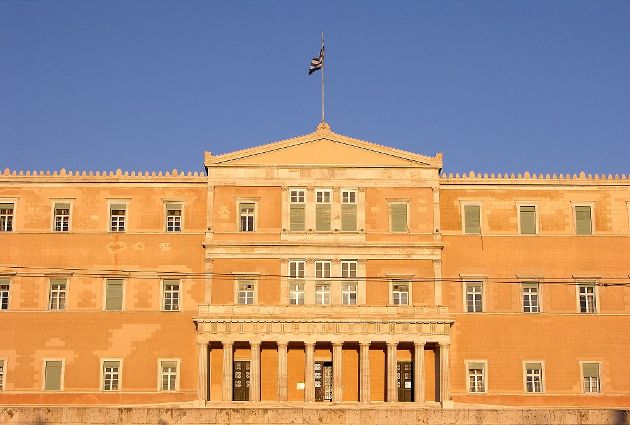
![The [Greek] European Tragedy](https://blogger.googleusercontent.com/img/b/R29vZ2xl/AVvXsEiWKI5s90SFm1wWTk6bs4p7CgslaC2SnYPsrZhb-B-smOufNNCSxCvpBLI9hOB-LsXZjir_PNmEiMk2-E62F3xkg96IoC6QFAaZAnPRTVH340IN9WBRmWJqPkjWlgyRj3zpALp7h6hvA58/s920/GkBack_new.jpg)


